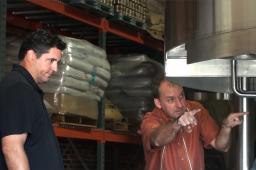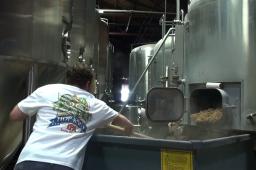- Slug: BC-CNS-Microbreweries-Cap, 1st Ld-Writethru,750
- Note: CORRECTS spelling of owner’s name to Scussel sted Scussil. A corrective to this story moved Monday, Sept. 28.
- Multimedia: Flash video for computers; YouTube video for mobile devices.
- With: BC-CNS-Microbreweries-Cap-Box
- Photos available (thumbnails, captions below)
By CHRISTINE ROGEL
Cronkite News Service
TEMPE _ Jim Scussel and his partners started Four Peaks Brewing Co. 13 years ago as a brewery and tasting room, rolling out kegs of Scottish Ale, Four Peaks Ale and Arizona Peach to restaurants and bars.
Four Peaks later opened a restaurant at its brewery here and another in north Scottsdale. And consumers now can purchase Kilt Lifter and its other brews at grocery and convenience stores around the state.
“We can’t make enough beer right now to supply what everyone wants,” Scussel said.
But the company’s success was close to becoming a liability. Supplying its restaurants and retailers from one brewery located at its Tempe headquarters put Four Peaks close to a state production limit of 620,000 gallons for microbreweries.
The partners could have established a second microbrewery with a separate license, but that would have cost $4 million against the $500,000 it would cost to expand the Tempe operation, Scussel said.
“This is owned by four guys,” he said. “We didn’t want to be in debt for the rest of our lives.”
But expanding production in Tempe would require an in-state producer’s license, which designates that microbreweries can sell only to wholesalers and allows them to have a restaurant only where they produce their beer.
That would force Four Peaks to close its Scottsdale restaurant, which has 90 employees.
“Putting people out of work _that was the biggest fear,” Scussel said.
Under a law taking effect Sept. 30, microbreweries will be able to produce twice as much beer in a year _ 1,240,000 gallons _ before needing to apply for a different license.
Rep. Michele Reagan, R-Scottsdale, the law’s author, said the measure brings Arizona in line with states that have more microbreweries and encourages growth in the industry.
“This was truly a commerce issue; it’s a business issue,” Reagan said. “We have businesses that want to expand and can’t under our current laws.”
Scussel said the law will help Four Peaks, Arizona’s largest brewery, open more restaurants around the state and someday expand its distribution into Southern California and perhaps New Mexico. But it also makes Arizona more attractive to out-of-state brewers considering starting operations here, he said.
“We would like more to come in _ kind of make it that Denver, Portland feel,” Scussel said.
There are 33 licensed microbreweries in Arizona, and according to the Arizona Department of Revenue luxury tax on beer sales generated $22.8 million for fiscal year 2009.
“Increased production means more jobs for our state, more tax revenue and is a clear sign of the growing popularity of local craft-brewed beers,” said Jerry Gantt, executive director for the Arizona Brewers Guild.
Fredrick Kraus, who owns Oak Creek Canyon Brewing Co. in Sedona with his wife, Rita, said the law doesn’t affect him for now because he produces around 125,000 gallons a year, far less than the current production cap.
“Basically the amount of self distribution that smaller brewers can do hasn’t really been impacted,” Kraus said. “But in my opinion it is a good thing; it allows everyone to continue to grow under the microbrew umbrella.”
“Microbreweries were trying to balance out the imports of foreign beer and allow beers to be made in this country,” said Jim Counts, owner of Nimbus Brewing Co. in Tucson. “The last thing you want to do is cut production and stifle growth.”
Dieter Foerstner, head brewer at Gordon Biersch Brewing Co. in Tempe, said the law doesn’t affect his business because each of the company’s breweries produces enough beer to meet the needs of one brew pub. But it’s nice for the industry to have the option of expanding production, he said.
“I’m glad that they are able to produce more beer and give their beautiful beers a chance to get out there,” he said. “It also gives smaller companies the opportunity to grow their business, and that’s what a free market society is all about.”
Reagan’s legislation faced little opposition in the House but drew six opposing votes in the Senate. One of the opponents, Sen. Paula Aboud, D-Tucson, said the Legislature ought to be working to discourage the consumption of alcohol.
“Alcohol contributes to so many problems in society,” Aboud said, “and for a legislature to be rubber-stamping further production of alcohol, even though we may pass legislation limiting consumption by youth, it still sends a message that alcohol is OK to consume.”
^___=
Web Link:
_ Four Peaks Brewery Co.: www.fourpeaks.com
^___=
PHOTOS: Click thumbnails to see full-resolution images.

Andy Ingram (left) and Jim Scussel, co-owners of Four Peaks Brewing Co., look at new equipment in the microbrewery’s Tempe headquarters. Supplying two brew pubs and a line of beers sold in stores, the microbrewery was approaching a state production limit that could have forced Four Peaks to close a pub that employs 90 people in north Scottsdale. Ingram and others say a new state law doubling the production limit for microbreweries will not only allow the industry to expand but will make it more likely that out-of-state firms will want to establish operations in Arizona. The law, authored by Rep. Michele Reagan, R-Scottsdale, takes effect Sept. 30. (Cronkite News Service Photo by Christine Rogel)

A worker tends to mash in the Four Peaks Brewing Co.’s Tempe headquarters. Supplying two brew pubs and a line of beers sold in stores, the microbrewery was approaching a state production limit that could have forced Four Peaks to close a pub that employs 90 people in north Scottsdale. Ingram and others say a new state law doubling the production limit for microbreweries will not only allow the industry to expand but will make it more likely that out-of-state firms will want to establish operations in Arizona. The law, authored by Rep. Michele Reagan, R-Scottsdale, takes effect Sept. 30. (Cronkite News Service Photo by Christine Rogel)

Customers sample the fare at Four Peaks Brewing Co.’s Tempe headquarters. Supplying two brew pubs and a line of beers sold in stores, the microbrewery was approaching a state production limit that could have forced Four Peaks to close a pub that employs 90 people in north Scottsdale. Ingram and others say a new state law doubling the production limit for microbreweries will not only allow the industry to expand but will make it more likely that out-of-state firms will want to establish operations in Arizona. The law, authored by Rep. Michele Reagan, R-Scottsdale, takes effect Sept. 30. (Cronkite News Service Photo by Christine Rogel)